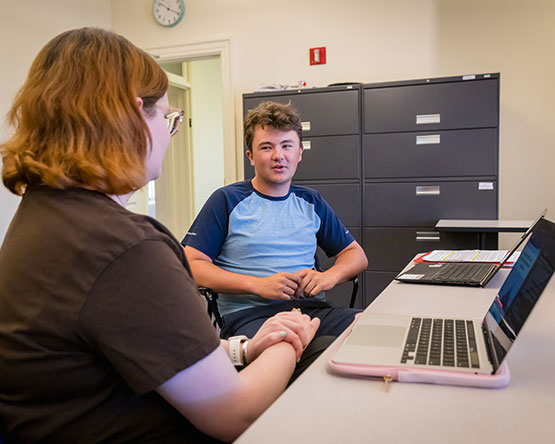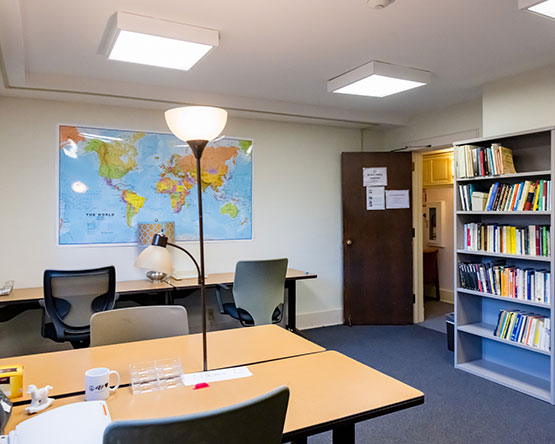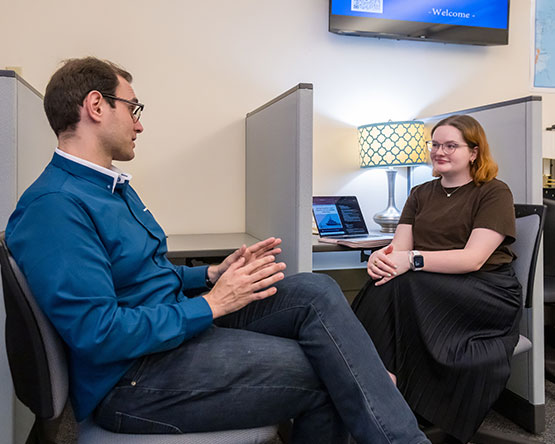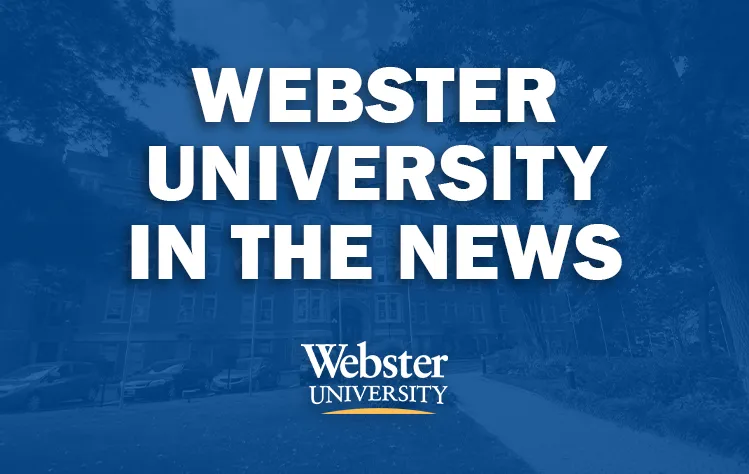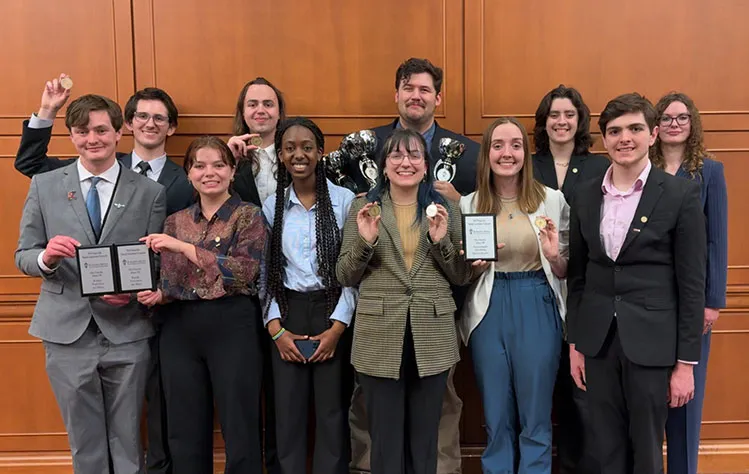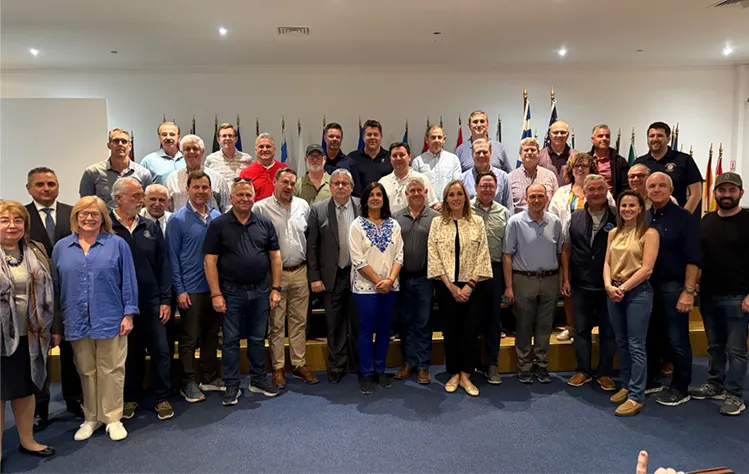About Our Research Lab
Webster University’s Global Policy Horizons Lab is a policy-focused research entity where students, lab researchers, affiliated faculty and members of the policy community from across disciplines, can explore national and global security issues, generate original research and produce peer-reviewed policy papers and commentaries. The lab pursues innovative research focusing on unconventional threats, identity and security, role of technology in security, economic security, as well environmental and food security. The goal of the lab is to become a knowledge hub that informs national governments and other members of the global policy community on contemporary and future security challenges.
The lab currently focuses on the following research streams:
- Unconventional Threats and Institutions
- Identity and Security
- Technology and Security
- Economic Security
- Environmental, Health and Food Security
Welcome from the Global Policy Horizons Lab Director
“Our Global Policy Horizons Lab at Webster University serves as a dynamic hub for cutting-edge research on pressing global security challenges. We bring together undergraduate and graduate researchers, faculty and professionals from around the world to analyze and develop policy-driven solutions that address the complex intersection of security and global affairs. At the lab, we foster interdisciplinary collaboration and innovative thinking, offering a unique space for students to engage with real-world problems and contribute to impactful policy recommendations. We are dedicated to shaping a safer and more just world through research and public policy.”
Dani Belo, PhD
Director, Global Policy Horizons Research Lab
Dr. Belo's Biography
Dr. Dani Belo is a teacher and scholar of international relations, specializing in conflict management and security. He is currently an Assistant Professor of International Relations and leads the Global Policy Horizons Research Lab at Webster University in St. Louis, USA. Belo is also a Fellow at the Canadian Global Affairs Institute (CGAI) and the Norman Paterson School of International Affairs in Ottawa, Canada. His research focuses on gray-zone and hybrid conflicts, transatlantic security, grand strategy, NATO-Russia relations, ethnic conflicts and the post-Soviet region. He also worked as a policy analyst for the Government of Canada.
Belo's research on unconventional conflicts was featured at the U.S Army Judge Advocate General’s Legal Center and School, the Royal Military College of Canada, University of Pennsylvania Law School Center for Ethics and the Rule of Law, Columbia University’s Harriman Institute and the European Commission. He led international research projects in Poland and Estonia, focusing on inter-ethnic relations and security. Several of his publications and presentations were used to inform international policy development at the U.S. State Department and Global Affairs Canada in relation to the conflict in Ukraine.

Global Hotspots in Focus

Israel-Hezbollah Conflict: Re-emerging Conflict Threatens Unstable Region (PDF) by Josh Hayes
The Israel-Hezbollah conflict reignited following the events of Oct. 7, 2023, and deepened when Israel entered Lebanon in Sept.2024 and has been a constant security concern in the region.

Policy Challenges in the Israel-Hezbollah Conflict: Iranian Influence Unveiled Summarized (PDF) by Samantha Ramay
Prompted by the Oct. 7, 2023, Hamas attacks in Israel, Hezbollah, assisted financially and militarily by Iran, entered the fighting in support of Hamas. The current ceasefire deal has left Lebanon with an opportunity for reform.

Resource Nationalism and Eco-Imperialism: Conflicting Views on Economic Mining Practices (PDF) by Xine Straw
Either by partial or total control, the governments of Latin American lithium mining countries have been trying to strike a balance between losing mining revenue and losing mining ventures entirely.
Our Publications
The effectiveness of foreign aid policies has been a central topic of debate since the rise of the development economics discipline. In this paper, I argue that these policies have failed to achieve genuine development because they prioritize economic growth over addressing sustainable human security needs. It is a necessary reconceptualization: a new model focused on a recipient-led model and specific local analysis in order to address the unique characteristics of each context. To achieve this, international organizations must decentralize their decision-making, enhance accountability and prioritize social indicators.
Read Full Research Paper by Inmaculada Cepeda De La Cruz (PDF)
The Research Question for this research is to find out how effective are the interventions of the United Nations Office on Drugs and Crime (UNODC) and the United States Agency for International Development (USAID) in combating human trafficking in Bangladesh, India and Nepal, and what challenges remain in addressing this issue comprehensively? Likewise, the study focuses on a comparative evaluation of UNODC and USAID's anti-human trafficking efforts in South Asia highlights significant progress in prevention and victim support but reveals gaps in policy enforcement, coordination and survivor reintegration, underscoring the need for sustainable, holistic strategies.
The ongoing war in Ukraine creates a context in which biased and unverified reports cause bewilderment among the audiences. This research article helps to better understand Russia’s war against Ukraine, specifically its causes, nature and human rights violations, by comparing it with an identical yet older and better-known case — the Bosnian War. This paper compares and analyses both conflicts through two paradigms of international relations and both political science and sociology, bringing attention to details that might be left uncovered. Comparative case study analysis, narrative analysis and quantitative and qualitative content analysis methods are used. The study comprises numerical data regarding killings and displacements, major human rights violations that frequently occur during armed conflicts, and speeches of Vladimir Putin and Slobodan Milosevic. It compares and interprets those materials through two theoretical perspectives — constructivism and ethnic nationalism. The research finds the immense role ethnic and national identity play in the current conflict, and how the key actors contribute to it.
Iran has long shown interest in Central Asia as well as the Caspian Sea nations. It wants to create an economic environment stable enough for it to survive the US punishments, as well as generally a stable Central Asia is good for Iran. Iran has the potential to be an important actor in the future because of its geographical location, size, military, and mineral resource expertise in the Caspian Sea. But it is just that, a ‘potential’. Iran has some influence in the region, but it is not significant at first glance as Central Asian republics did not appear to be taking Iran seriously, I argue that it is, as it is a shaping operation for Iran’s dreams of larger influence in the region. Iran’s strongest influence is in Tajikistan, and that is the subject of this paper. In the early 90’s, Iran was the first country to open its embassy in the newly independent Republic of Tajikistan. Although both countries had a few setbacks in their relations along the way, i.e. Tajikistan blaming Iran for its civil war or the religious disagreements between the two, we still could see a positive relationship between them. It is easy to look at the history of the two and notice that Iran, even when rejected by Tajikistan, still extends an olive branch. Some scholars argue it is because of their shared culture, but I argue it is contributing to that “culture-building” operation. It is important to think about the long term when looking at Iranian actions, or else we might just wake up to it when it may be too late. Looking at it from that perspective makes it easier to see the shaping operations taking place in hopes of more soft power in the region in the future.
This paper examines Russia’s historic and continued use of Gray Zone Engagement in the Baltic Region and its justification for doing so. Since the formal dissolution of the Soviet Union in December 2001, post-Soviet states spanning Eastern and Central Europe have been faced with focused, enduring political and socio-economic pressure from the Russian Federation, in some form or fashion. Over time, the tools and methods employed to exert this pressure have evolved, drifting away from “traditional” conflict, threatening overwhelming conventional military operations, and gravitating towards what is known today as “gray-zone” conflict, threatening a wide array of operations, often ambiguous and non-violent in nature. During this same span of time, many of these same post-Soviet states have efforted to distance themselves from the union with which they had long been associated. To that end, action, sometimes swift and unforgiving, has been taken in many forms, spanning the political and socioeconomic spectrum. The Central and Eastern European regions currently face two important questions of policy: Is Russia justified in the focus and implementation of its diaspora strategy, at the expense of overstepping social and political boundary via operations within independent nations? Are post-communist republics justified in their application of minority rights policies, in the interest of ensured national independence and freedom from foreign influence? Through thorough examination of these dueling policies and chief examples of their employment, this paper aims to explore the justification of Russia’s use gray zone engagement in the Baltic Region, through the lens of foreign policy strategy aimed at leveraging targeted social issues via soft power financial, educational, and cultural activities. This political approach undertaken by Russia of gray zone engagement in the near abroad is one requiring major focus and concern from policymakers worldwide.
The intent of this policy recommendation is to force President Putin to the negotiating table after he realizes there are no more options within his military arsenal to obtain further political objectives. Furthermore, this recommendation is to not advocate for the destruction of Russia nor regime change, but to contain the fighting within Eastern Ukraine. This policy recommendation is broken down into three aspects. ... The end state of this policy is a cease-fire agreement between Russia, Ukraine, and the West, and additionally, to deter actors from potential violent land grabs. Deterrence is a likely outcome due to the sheer loss of life, the stress on the economic system, and the geopolitical standing in which the nation now finds itself. The unfortunate reality is that even though this war is broadcast as a paradigm of good versus evil, the West and Kyiv must realize that in the nuclear age, complete Ukrainian victory should never be considered a realistic nor likely outcome.
Developing countries that receive peacekeeping operations exhibit gender disparities within their educational systems. The period spanning from the 1980s to the 2000s has witnessed a notable rise in the level of educational achievement among female students. I am interested in understanding the role of peacekeeping operations in facilitating the transition to peace and post-conflict reconstruction in various nations that encourage educational development. Is there evidence of a societal shift with regards to the prominence of women peacekeepers in leadership roles, and if so, does this have a positive impact on the educational aspirations of young girls? The deliberate selection of secondary education is attributed to the fact that it encompasses a significant developmental phase for adolescents, spanning from ages 11 to 12 and extending to 18 to 19. This period represents the most substantial gap in education and a crucial time of transformation for this demographic. The study aims to examine the potential impact of female peacekeepers on the educational outcomes of secondary school girls, and if this shift in gender roles influences young girls both prior to and following intervention.
We have more to blame on global warming than just rising seas or increases in severe weather. The Arctic, a once untouched landscape, is now at the forefront of geopolitical tensions. Due to the increase in overall global temperatures, the Arctic ice cap and the Greenland ice sheet are melting. The receding ice, once a formidable barrier to human activity, is giving way and countries around the world are keen to take advantage of the Arctic’s ever more accessible sea lanes, and lucrative resources. Arctic states have increasingly found themselves in competition for these resources and regional politics, once known for their idyllic cooperation and communal sense of purpose, are now strained. The institutions made for a once exceptional Arctic are failing to adequately respond, and mounting pressure from countries beyond the traditional Arctic states, (the United Sates, Denmark, Russia, Canada, Norway, Iceland, Sweden, and Finland) in particular from China, has made management via current governance difficult. Thus, the question is not whether reform is needed, but how best to manage that reform. Conflicting views among the Arctic states regarding security and access have led to two immediate arguments. One advocating for stricter controls on Arctic access, in particular regarding China and rising non-Arctic states. While the other advocates for greater global cooperation and inclusion surrounding the Arctic, especially in light of climate change. Though China is undoubtedly a challenger to the current rules-based order, the Arctic nations have more to gain by cooperating with rising non-Arctic states such as China, than they do by excluding them. Exclusion will only increase what is already taking place, active efforts to subvert current governance and navigate outside of it (Doshi et al., 2021). Effort put forth to actively exclude nations from the Arctic, be it in the form of trade or security policies, will be effort wasted and effort that could have otherwise been used towards building stronger legally binding agreements. Agreements that are created through cooperation and inclusion, not exclusion.
The October 7 Hamas terrorist attacks that resulted in the massacre of at least 1200 Israelis has again made an incredibly tough issue one of the primary concerns of policymakers focused on international security. The attacks were extremely gutting due to the barbaric nature of the murders and horrific images and stories that continue to come out every day. Because of the life altering events that took place that terrible day, it was understandable and most definitely expected what the response of the Israeli government would be. Despite the recent political turmoil in Israel, including an extremely controversial and un-democratic judicial overhaul, corruption charges against Prime Minister Benjamin Netanyahu, and the never-ending cycle of parliamentary elections that left no clear winners, the government was able to quickly unite to form a war cabinet. Despite this united front, there are real questions about how the Netanyahu government missed the many clear warning signs about the attacks, as well as the confirmed report that Egypt warned Israel about the attacks not long before they happened. It is widely expected that Netanyahu will be forced out following the conclusion of the initial stages of the war effort, but the Prime Minister seems to have as many political lives as a cat so that is unclear. There are also real questions about what the actual objectives of Israel should be and are in their military operation in Gaza. This paper will consider this question, but it is also necessary to understand what drove Israeli foreign policy before this. This paper will not dictate what Israeli foreign policy should be, but it will investigate what is possible while still reflecting the decades long foreign policy of Israel. This paper will argue that Israeli foreign policy, conducted through regional hybridism, is primarily driven by the state’s desire for survival, which explains their posture towards their Arab neighbors, state and non-state actors alike.
In the post-Cold War era, the global landscape has witnessed a surge in Western democracy promotion efforts, with international organizations (IOs) playing a significant role. However, recent trends have revealed a paradox: states transitioning to democracy under the influence of these IOs are experiencing a rise in illiberalism. This research delves into this complex relationship, focusing on the tendencies toward democratic backsliding and autocratic reversion despite membership in democracy-promoting IOs such as the European Union and the Organization of American States. While IOs generally advocate for democracy, it is argued that they have inadvertently contributed to setbacks in democratic progress in emerging democracies. By exploring the nuances of this phenomenon, this research sheds light on the challenges and contradictions within the realm of international democracy promotion.
Disinformation campaigns are as destructive in strong states in the west of Europe as in weaker states in the Southeast of Europe and at the EU-Russian border. There are flaws in the current strategy of the EU to limit the effects of disinformation campaigns launched by Russia. This can be observed by researching the causes of societal friction that can be a result of foreign influencing public opinion with malign intend. The article is structured into four sections: an explanation of concepts such as the gray zone and Russia's modus operandi, an overview of current strategies countering Russian disinformation in the EU, and an analysis of the current shortcomings in these strategies. Lastly, a proposal for a strategy based on societal resilience for liberal democratic nations is presented, along with recommendations for altering strategies in the EU and liberal western democracies like the Netherlands, France and Germany.
With the collapse of Soviet Union and the subsequent end of Cold War era superpower confrontation, the continued relevance and survivability of NATO has been put into question. While many predicted that alliance would cease to exist, it has not only weathered the storm of changing geopolitical landscapes but has also emerged stronger. Given that, this study will offer a comprehensive analysis in answering an important question: what explains NATO’s resilience in the post-Cold War era, considering the complexities and challenges it has confronted? For background, this study presents a selected roots of NATO and explores the merits of its longevity before offering broader policy implications of this narrative. It then argues that NATO, far from being a historical artifact, stands as a dynamic and indispensable organization in the contemporary global security architecture. Its ability to evolve while preserving its fundamental principles underscores the alliance’s enduring relevance, positioning itself as a crucial force in maintaining peace and stability in the ever-changing world.
This study examines Japan's immigration policy, highlighting its deep-rooted societal and historical uniqueness. Advocating for a shift, it suggests Japan consider an approach resembling Germany's multicultural model. Utilizing the Advocacy Coalition Framework (ACF), the research delves into the intricate dynamics of Japanese immigration, emphasizing the pivotal role of advocacy coalitions in shaping policy outcomes. The ACF theory indicates that policy changes stem from diverse actors' interactions, each driven by their distinct beliefs. The paper contrasts Japan's conservative stance with Germany's progressive, inclusive policy, underscoring the profound influence of advocacy coalitions in both contexts. The findings offer potential insights for shaping future immigration policies in Japan.
The relationship between the European Union (EU) and the Russian Federation (RF) can be characterized as a complex fusion of conflict and cooperation. This research paper argues that the two political entities should prioritize maintaining a constructive relationship and amiable foreign relations. The three chief areas of economic and energy security, international security and regional stability frame the nature of the EU-Russia partnership. A potential framework to navigate that relationship should address both areas of cooperation and conflict, while promoting transparency, security and stability. By examining the complex relations of the EU and Russia on different levels of cooperation, policymakers can benefit from a better understanding of the partnership between the two entities. Future research initiatives could focus on identifying precise policies that can further advance the relationship between the EU and the Russian Federation.
To Save the Environment: Sustainability at the Expense of the Salares (PDF) by Xine Straw
Countries in the lithium triangle have allowed and encouraged mining operations despite the protests of the indigenous communities living there that threaten the environment, the economic well-being of indigenous communities in mining territories, and in turn the culture of said indigenous peoples.
The Philadelphi Corridor: Examining a Major Impediment in Ceasefire Talks (PDF) by Josh Hayes
As mediators and parties discuss important concerns in Cairo and Doha, surrounding the ceasefire proposal for the Israel-Hamas War in Gaza, a seemingly small, albeit important sticking point has emerged: The Philadelphi Corridor.
When examining the social fabric of the United States and Canada, it becomes clear that there are notable differences in the basic tenets of being an American or a Canadian. It is intriguing to witness the divergent methods employed in states that provide citizenship via birth, ancestry, and the process of becoming a citizen when it comes to incorporating immigrant communities. This study investigates the intricate relationship between the societal structures of destination nations and efforts to engage immigrant populations. This essay examines the abstract representation of a destination state as a melting pot and mosaic society and how it affects the relationships and affiliations of diaspora citizens. This research examines the impact of diversity and assimilation models on how the diaspora perceives opportunities and their ability to take action in the country they have migrated to. The objective of this study is to ascertain if a melting pot setting fosters assimilation and diminishes affiliations with the home state, or if a mosaic society may foster the preservation of cultural identity and deeper links to the diaspora's homeland. Furthermore, the paper explores the potential securitization of diaspora groups as a result of their alignment with the objectives of the host nations. This article will specifically examine immigration post-9/11. We will analyze the process of incorporating the immigrant communities into the social and economic fabric of both the United States and Canada. We shall analyze if there is a rise in the securitization of this diaspora. The objective of my thesis is to examine how the structure and organization of society influence the degree to which immigration is treated as a matter of national security. Will the absence of adequate assimilation in a multicultural society result in heightened marginalization among immigrant communities? When examining mosaic societies, will it become apparent that the preservation of cultural identity and encouragement of variety might provide obstacles to attaining full integration while also addressing security concerns?
The Populist Democratic Backsliding Model, or the PDB Model, has been developed to illustrate a connection between populism and democratic backsliding. This is explained through the lens of securitization and populism's role within the external context of the securitization process. The PDB model argues that the use of a populist political style indicates a greater risk of democratic backsliding.
Daniel Yergin’s "The New Map: Energy, Climate, and the Clash of Nations" provides a comprehensive analysis on the intersection of global energy landscape with the broader geopolitical and economic engagement and competition among states. Through detailed narratives and historical contexts, the author explores the transformational impact of the shale revolution, the subsequent shifts in energy dynamics among major states like the U.S., Russia, China and the Middle East, and the intricate interplay between energy supply, demand and geopolitical tensions. Although the book delves deeply into the geopolitical aspects, it encounters criticisms for its limited focus on certain demand-side countries, minimal attention to climate change urgency, and insufficient exploration of potential long-term implications of renewable energy transitions. Despite these limitations, "The New Map" offers valuable insights into the complex relationship between energy, geopolitics and global security, making it a compelling read for researchers, policymakers and readers interested in understanding the intricate web of energy and international relations in the modern world.
Since the fall of Muammar Gaddafi in 2011, Libya has struggled to regain stability. What was intended to be an uprising filled with hope and a move toward democracy turned into a civil war causing various issues across the country. It has been marked by power struggles between rival governments in the east and west, the growing influence of local militias and deep foreign interference. General Khalifa Haftar’s 2019 offensive to seize Tripoli only worsened these divisions, pushing the country further into violence instead of bringing the stability he had promised . The United Nations has made several attempts to implement peace and bring the parties to the negotiations. While some efforts, like the call for a ceasefire and a national conference, offered brief moments of hope,real political dialogue has often depended more on battlefield developments than on diplomacy. The lack of unity among the international actors some of whom continue to arm and support opposing sides has weakened the UN’s impact, making its role a mix of positive intentions and limited results. International interventions in Libya, whether from foreign powers or the UN, have often worsened internal divisions by supporting rival factions, making the reconciliation and stabilization process more difficult.
Libya’s economy, heavily reliant on oil, has proven to be both a source of wealth and a source of vulnerability. Before 2011, oil made up nearly 95% of Libya’s GDP, making the country wealthy in theory, but dangerously fragile in reality. Since the fall of Gaddafi, armed clashes, political instability and frequent blockades have repeatedly disrupted oil production. With no stable economy or functioning central authority everyday life has become increasingly difficult for ordinary Libyans.
In many areas, people now lives under the control of armed groups who use access to fuel, jobs, and even basic services as tools of power. The breakdown of the state didn’t just damage institutions it deeply affected livelihoods, hopes and trust among communities and tribes. Entire generations are growing up in uncertainty, where survival depends less on education or opportunity and more on allegiance, luck or proximity to power.
Lithium mining in the Andean Altiplano is paramount to the world’s transition to green energy. Latin America, specifically what is considered the ‘Lithium Triangle’ holds over 60% of the world’s land lithium, concentrated in brines underground. Mining practices in the Lithium Triangle are imperative in their role in slowing worsening environmental conditions, but their current practices are doing unforeseen damage to the environment in the salares. This environmental degradation, along with the harm done to the communities living in Chile’s portion of the lithium triangle, is creating an unsustainable and toxic region, killing off important plants and animals in the ecosystem, and altering the geological structure of the region. All this destruction is making for a path to greener energy that “ruin[s] one zone to satisfy another” (Quote from Francis Mandoca, Atacama Indigenous Council Leader).
However, it is undeniable that lithium mining is playing a role in situating Chile in the global extraction market. By trying to develop more state control over lithium production, the Chilean state is gaining revenue and support in the market from the mineral. These recent policy changes include passing new mining regulations that require companies to work more closely with the state-owned mining corporation Codelco6. This paper discusses the ramifications of allowing lithium mining to continue as it has been while also acknowledging the importance that lithium mining is playing in Chile’s economy. It raises the question, do the benefits of lithium mining outweigh the costs?
This report is an update on the May 2024 report.
As of November 2024, the Houthis have continued their targeting of shipping vessels in the Red Sea. The total number of merchant vessels targeted is nearly 100. In total, the Houthis have seized one vessel and sank two, killing four sailors in the process. The US-led coalition present continues to intercept attacks against ships. On October 16, American B-2 stealth bombers carried out strikes, hitting five underground Houthi weapons storage facilities. This action was the first use of stealth bombers in the conflict against the Houthis and has been interpreted as a message of deterrence against Iran. The Houthis retaliated against these attacks by attacking two US warships, but the missiles were unsuccessful in reaching their target.
This report is an update on the May 2024 report.
In Oct. 2023, the region of Israel and Palestine, places already susceptible to violence, descended into a violent conflict following the Oct. 7 Hamas terrorist attacks within Israel, that killed over 1,200 Israelis and resulted in over 240 hostages being taken. Israel responded with a full-force ground invasion of Gaza; a Palestinian territory controlled by the terrorist group Hamas. Since the onset of violence, there has been a significant decline in already low human development levels in Gaza as well as a significant drop in economic performance in Israel. The war has led to nearly the entire population of Gaza being internally displaced, along with over 35,000 deaths. Currently, the greatest risk within Gaza is the potential for famine which is largely due to the inability to get enough humanitarian aid into Gaza and the right hands. On a military level, Israel’s stated goal of the war is the destruction of Hamas and its ideology which is tricky if not impossible to measure and complete. In 2024, the war spread to Lebanon for a few months where Israel had similar goals against Hezbollah, with some successes in this round of fighting. Even if Israel is successful in their goal, the question that will be raised is what comes next. The current Israeli government, the most right-wing in its history, is unwilling to negotiate on a potential sovereign Palestinian state, but without the possibility of such a state, the violence between the two sides may never truly end. Diplomatic efforts of major international players and neighboring Arab states in the short term will be aimed at the release of hostages and a durable pause in fighting to get aid into Gaza. Ceasefire talks have largely stalled for now, although some hope exists that Hamas will be more amenable to a deal following Israel’s assassination of Yahya Sinwar, Hamas’ leader and architect of the Oct. 7 attacks. Additionally, the election of Donald Trump to U.S. President has the potential to throw a wrinkle into negotiations as his policies towards peace in the region are significantly more skewed toward Israel than the current Biden administration. In the long term, a political solution will need to be implemented to the conflict, likely involving a Palestinian state and security guarantees, but only if both sides agree. How the situation develops will affect the entire region in the decades and centuries to come.
Following months of sustained attacks between Israel and Hezbollah, a militant group and Shiite political party in Lebanon, Israel entered Lebanon in September 2024 for a limited incursion that would push Hezbollah away from the border region. Initially, the move was met with skepticism by Israel’s international partners, including the United States, given the already complex war ongoing in Gaza. However, after a period of internal discussions, the U.S. supported a targeted incursion. This has been largely targeted at Beirut and its surrounding suburbs to move Hezbollah away from the border, reducing their capability to launch attacks either with soldiers or drones, and eliminating them as an effective Iranian proxy. Efforts to implement a ceasefire have been complicated by the internal political dynamics in both Israel and Lebanon, Iran’s desire for its proxy Hezbollah to continue provoking Israel, the ongoing war in Gaza, and international pressure to end the current iteration of the Israel-Hezbollah conflict. As of late November, a ceasefire has been reached in the short term. While in the short term, a return to escalation, as well as a complete end to the conflict, are unlikely, an eventual end to direct fighting as well as damaging Hezbollah’s capacity to attack Israel are both goals of the international community. Moving forward, mediators will hope that the ceasefire holds, stabilizes Lebanon along with the Lebanese government, and de-escalates tensions between Israel and Iran before the region lurches further toward irreversible destruction with two states with near-nuclear capabilities.
Prompted by the Oct. 7, 2023, Hamas attacks in Israel, Hezbollah entered the fighting in support of Hamas by firing artillery and rockets across Lebanon's shared border with Israel. Iran assists Hezbollah financially and militarily and uses Hezbollah to engage in the "Unity of Fronts" tactic against Israel. Since the conflict began, almost daily exchanged fire has occurred over the border between Israeli and Hezbollah forces. More than a million civilians on both sides of the border have been displaced, and the conflict resulted in the vast destruction of homes and agricultural lands in the area. The exchanges escalated on Sept. 17, 2024, when an Israeli attack prompted the explosion of Hezbollah pager devices in Lebanon, killing multiple and wounding thousands. As of early November 2024, after continued attacks on both sides that have resulted in thousands of fatalities, a ceasefire agreement between Lebanon and Israel seems to be a viable possibility.
As a result of the Oct. 7, 2023, Hamas attacks in Israel and the ongoing response from Israel in Gaza, the Houthis, a rebel group in the Republic of Yemen, have entered the conflict in ideological solidarity with Palestine. After firing an unknown number of drones and missiles toward Israel throughout October and November, on Nov. 19, the Houthis seized an Israeli-owned shipping vessel in the Red Sea. Since then, extending into 2024, they have attacked more ships passing through the trade route, now extending beyond Israeli-owned vessels, with drones, missiles and speed boats. These attacks have threatened international trade and have prompted the United States to form Operation Prosperity Guardian, an international military coalition aimed at protecting ships traveling the Red Sea. The Houthis are part of Iran's proxy system, allied ideologically and supported militarily. Saudi Arabia supports the internationally recognized government of Yemen, and the conflict for power between the Houthis and the Yemeni government is indicative of the proxy war between Saudi Arabia and Iran that has developed since 2015. Yemen is currently experiencing the world's worst humanitarian disaster. With tensions high in the region due to the Israel-Palestine conflict and increasing animosity between Israel and Iran, the Red Sea attacks are a possible catalyst for a bigger and more devastating regional conflict.
In Oct. 2023, the region of Israel and Palestine, places already susceptible to violence, descended into a violent conflict following the Oct. 7 Hamas terrorist attacks within Israel, that killed over 1,200 Israelis and resulted in over 240 hostages being taken. Israel responded with a full-force ground invasion of Gaza, a Palestinian territory controlled by the terrorist group Hamas. Since the onset of violence, there has been a significant decline in already low human development levels in Gaza as well as a significant drop in economic performance in Israel. The war has led to nearly the entire population of Gaza being internally displaced, along with over 25,000 deaths. Currently, the greatest risk within Gaza is the potential of famine which is largely due to the inability to get enough humanitarian aid into Gaza and the right hands. On a military level, Israel’s stated goal of the war is the destruction of Hamas and its ideology which is tricky if not impossible to measure and complete. Additionally, there is a possible although less likely option of the war expanding to other actors such as Hezbollah or Iran. Even if Israel is successful in their goal, the question that will be raised is what comes next. The current Israeli government, the most right-wing in its history, is unwilling to negotiate on a potential sovereign Palestinian state, but without the possibility of such a state, the violence between the two sides may never truly end. Diplomatic efforts of major international players and neighboring Arab states in the short term will be aimed at the release of hostages and a durable pause in fighting to get aid into Gaza. These talks are currently ongoing and are being led by Qatar and Egypt but so far, a breakthrough hasn’t occurred. In the long term, a political solution will need to be implemented to the conflict, likely involving a Palestinian state, but only if Israel agrees. How the situation develops will affect the entire region in the decades and centuries to come.
Conference and Presentation Events

Dr. Dani Belo and student researchers Saram Pulipaka and Paul Hoeffken from the Global Policy Horizons Research Lab discuss foreign policy decision-making models and the implications of India's growing influence in contemporary global affairs.
View The World In Crisis ... And India Is the Winner? on YouTube

On Nov. 7, 2024, undergraduate and graduate students from Webster University gathered for a novel conference titled Testimonies, a unique collaboration between the Global Policy Horizons Lab and the English Department’s Poetry of Witness seminar. The event offered a platform for students to explore the power of poetry in capturing and responding to contemporary crises, featuring three thought-provoking panels: The Echoes of War, Resonances of Trauma and The Poetics of Criminality.
Dr. Dani Belo, assistant professor of Security and International Relations and director of the Global Policy Horizons Lab, emphasized the significance of bridging the analytical and the experiential in responding to global crises. “This conference exemplifies how the humanities and social sciences can work together to deepen our understanding of conflicts and security,” he said. “Policy analysis is strengthened when we remember the human stories behind statistics and strategies. Poetry, in this sense, can be a powerful tool for humanizing issues that often feel abstract.”

This student-moderated panel discusses the implications of Russian disinformation campaigns and features presentations from Dr. Dani Belo (International Relations), Dr. Jim Curtis (Cybersecurity), student Naima Dawid (International Relations) and Dr. Allison Gorga (Criminology), moderated by student Blake Browning.
View The Anatomy of Disinformation: Examining the Russian Playbook on YouTube

Maya Asadova
Don Maland Researcher in International Conflict Analysis and Resolution, Middle East and Central Asia

Devin Courville
Researcher, Global Security Policy

Naima Dawid
Researcher, Identity and Security
Naima Dawid is a third-year international relations major at Webster University in St. Louis, USA. She is utilizing Clive Hamilton's "Silent Invasion: China's Influence in Australia" to write a research paper on a comparative analysis of the securitization of diaspora groups in China (Australia) and Russia (Ukraine and the Baltics).

Sara El Mir
Researcher, Middle East and Northern Africa (MENA)
Sara El Mir is a master’s candidate in International Relations at Webster University in St. Louis. She holds a bachelor’s degree in International Business, earned in France. Her academic interests lie in the Middle East and North Africa (MENA) region, with a particular focus on humanitarian issues and human rights law.
At the Global Policy Horizons Lab, El Mir's research centers on North Africa, with a specific emphasis on Libya. Her work investigates the persistent instability in Libya, characterized by political divisions between two rival governments and ongoing tensions and conflicts that disrupt the country. By analyzing the root causes of Libya’s political divisions and their implications for regional stability, she aims to assess potential scenarios for the country’s and region's trajectory in the coming year.

Josh Hayes
Don Maland Researcher in International Conflict Analysis and Resolution

Saira Iqbal
Researcher, U.S.-Mexico Relations and Middle East Affairs

Hannah Peterson
Don Maland Researcher in Human Rights in Iran

Samantha Ramay
Don Maland Researcher in International Conflict Analysis and Resolution

Xine Straw
Researcher, Human Security and Latin American Politics

Evelyn Truong
Grant Writer

Alex Aissaoui
Fellow
Alex Aissaoui (M.Scs., University of Helsinki) is a researcher in the Ancient Near Eastern Empires team at the University of Helsinki, Finland. He is writing his doctoral dissertation titled “A Regional International System or an International Society of States? Near Eastern Diplomacy during the Second Millennium BCE.” Therein, he is exploring whether the ancient Near Eastern diplomacy constituted a systemic international arena where complex interdependence and intersubjective agreement existed. Aissaoui is focusing on the political correspondence between the great kings and their vassals (e.g., Mari archives, Amarna letters). He is especially interested in whether classical IR concepts such as balance of power, international anarchy and sovereignty apply to the ancient Near Eastern political landscape.
Contact: alex.aissaoui@helsinki.fi

Alisher Faizullaev, DSc and PhD
Fellow, Visiting Professor
Professor Alisher Faizullaev, DSc in Political Science and PhD in Psychology, is a scholar, author, teacher, diplomatic and negotiation skills trainer, and coach. He was the ambassador of Uzbekistan to the United Kingdom (1999-2003), Benelux countries, the European Union, and NATO (1995-1998). He was a Fulbright Scholar at the Fletcher School of Law and Diplomacy, Tufts University, and the Institute for the Study of Diplomacy, School of Foreign Service, Georgetown University (2011-2012), as well as a Visiting Scholar at McGill University (2014), Cambridge University (2005) and Western Washington University (1992).
Faizullaev has published numerous books and scholarly articles on diplomacy and negotiation. His last book “Diplomacy for Professionals and Everyone” was published by Brill in Leiden and Boston in 2022. In 2023-2024 he was a Leif J. Sverdrup Global Teaching Fellow and visiting professor at Webster University, St. Louis, Missouri.
Contact: afaizullaev@webster.edu

Adrien Houguet, PhD
Fellow, Cultural Diplomacy
Adrien Houguet is a Franco-German PhD specialized in the field of cultural diplomacy. His research primarily focuses on the artistic activities of French and German cultural institutes, particularly within the post-Soviet region. His latest work focuses on the internal and external challenges of the Franco-German Cultural Institute in Kyrgyzstan within a highly competitive soft power landscape in Central Asia.
Contact: adrienhouguet@webster.edu
Selected Publications
Houguet, A., Josset, B. (2023). Vers une diplomatie numérique transnationale. Le cas des instituts culturels franco-allemands de Bichkek et de Ramallah. (Towards a transnational digital diplomacy. The case of the Franco-German cultural institutes in Bishkek and Ramallah.) Questions de communication n°44 « La diplomatie publique à l’heure des réseaux ».
Houguet, A., Akhmatova, M., (2023). In the middle of influence struggles: Are Central Asia and Kyrgyzstan an ideal context for an in-depth study on soft power? Institut d’Études Géopolitiques Appliquées, Paris.
Houguet, A, (2023). La diplomatie culturelle de l’Allemagne et de la France en fédération de Russie. Entre soft power et accommodation. (French and German Cultural Diplomacy in Russia: Between a soft power and an accommodation approach.) In Trajctoires n°16 « Écrire l’exil ». (Summary of my PhD thesis).

Zin Mar Khing
Fellow

Grace Shipley
Fellow

Libby Stiles
Fellow
Strategic Partners
The Global Policy Horizons Lab partners with universities, think tanks, government agencies and Webster's global network of campuses to advance policy-relevant research on global security challenges. These partners contribute expertise, data access and institutional support, strengthening the Lab’s interdisciplinary work. Through joint projects, publications, conferences, workshops and policy discussions, they help bridge the gap between academic research and real-world decision-making.
In addition to Webster Geneva Campus and Webster Tashkent, our strategic partners include:

Join the Research Lab

Come Work With Us!

Here's your chance to make a difference, working with Dani Belo, PhD, researching international security pursuing research streams like:
- Unconventional Threats and Institutions
- Identity and Security
- Technology and Security
- Economic Security
- Environmental and Food Security
Research Assistant in International Security
On-Campus Student Employment, Department – History, Politics and International Relations
10 hours per week, January to May 2025.
Eligibility: Webster University undergraduate domestic students.
Compensation: $13+/hour
Purpose of the Research Assistant Position
The purpose of the Research Assistant position is to pursue a research project under the supervision of Dr. Dani Belo at the Global Policy Horizons Lab.
Job Duties and Responsibilities
The work of the Research Assistant will consist of two major tasks.
Primary Task:
We are seeking a dynamic and experienced Policy Researcher to join our team. The ideal candidate will possess an understanding of the region's political, economic, and social landscapes. Responsibilities include conducting in-depth research, analyzing policy impacts, and producing comprehensive reports to inform and influence policy decisions.
The student researcher will conduct qualitative analysis of policy and/or peer review material from databases and open sources, as well as produce two policy papers on case studies.
By the end of the work contract, the Research Assistant will produce a 10- to 20-page policy-focused report of publishable quality on their findings based on peer-reviewed, scholarly policy material and reports.
Secondary Task:
The Research Assistant will help in the formatting of submitted publications to be posted on the Global Policy Horizons website.
The Research Assistant will be given individual office space, where they will be expected to work throughout their employment and be available for meetings.
This position is an Experience with the Impact Center. Impact Center Experiences guarantee skill development and allow you to earn digital badges, which can help showcase your achievements and contribute to your future employability. In addition to applying for this job, contact the Impact Center at impactcenter@webster.edu to find out more about the Experiences.
Required/Preferred Qualifications
The position is open to all Webster colleges, departments and campuses. As students will be required to work with databases of peer-reviewed publications, experience with library-based research is an asset. The student will have access to Webster University staff to assist with research. Qualified students must possess excellent writing, reading and analysis skills.
Physical Demands
Light office work.
Duration
Temporary/Seasonal
Application Instructions
To apply, submit:
- a cover letter discussing your background and interest in the position, and relevant experience working with contemporary policy issues (either in classes and/or outside the University),
- a current resume or CV, and
- one letter of recommendation of no more than 300 words from an instructor, supervisor, advisor or mentor.
APPLY FOR A RESEARCH ASSISTANT POSITION AT HANDSHAKE
Applicants must submit documents through the Handshake system. Log in or create an account using your Webster email.
In your cover letter, please explain why you would like to participate in this opportunity and what your strengths and weaknesses are. Lack of experience will not count against you; we simply want to know what skills you have developed already and what skills you want to develop. Please submit your application through Handshake, Webster’s web-portal for job postings.
- What is your major?
- What excites you about this opportunity?
- What do you hope to learn (skills, content, etc.)?
- What do you hope to contribute? What experience, if any, do you have in this arena?
Request that your letter of reference touch on similar themes: your strengths, weaknesses and fit for the position. Please have your reference email their letter directly to Professor Dani Belo at danibelo@webster.edu
Review of applications will begin immediately and proceed until the position(s) is filled.

Undergraduate-Level Internships



